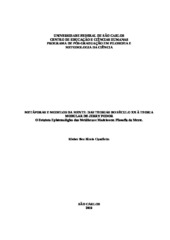Metáforas e modelos da mente: das teorias do século XX à teoria modular de Jerry Fodor. O estatuto epistemológico das metáforas e modelos em filosofia da mente

Visualizar/
Data
2008-05-19Autor
Candiotto, Kleber Bez Birolo
Metadata
Mostrar registro completoResumo
The aim of this research is to present a discussion and an analysis of the epistemological statute of the main theories regarding the philosophy of mind. In order to do that, we have developed some basic notions of the scientific investigation theory to determine the degree of assurance, certainty and scientificity that go with some of the descriptions, metaphors, models and theories concerning the philosophy of mind. After that, we organized an itinerary of the main models and metaphors in mind research, from the birth of 19th century Psychology to the Cognitive Sciences of the last three decades. We have identified the alternance criteria regarding the metaphors and models that have been used in research about the mind. Then, we reached what we have called a triple dominion of models, which has been used along the 20th and in the beginning of the 21st centuries: the representational and information processing model, deriving from the Cognitive Sciences; the Cognitive Neuroscience, which resumes philosophical issues such as mind and intentionality; and the biological model, specifically the one concerning Evolutionist Psychology. We have tried to demonstrate the epistemological and methodological bases and the competences of this new dominion of models, as well as their limits and reach. In this way, we come to the thesis itself: the proposition that Jerry A. Fodor s representational and modular notion of the mind is a perspective that converges on such triple dominion. We understand that Fodor s contributions are basic for a research program in the philosophy of mind, considering that the program aims at defining methodological strategies and it also reviews essential epistemological issues. Regarding the discussions about the mind, Fodor emphasizes that psychology requires philosophical support and that there should be a flow of theses from psychology to philosophy as well; in this way, reductionist theories and conceptual illusions would be avoided. Fodor s epistemological contribution is a reference regarding the explanation of mental states, avoiding the proliferation of terms and notions.